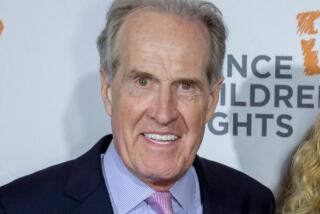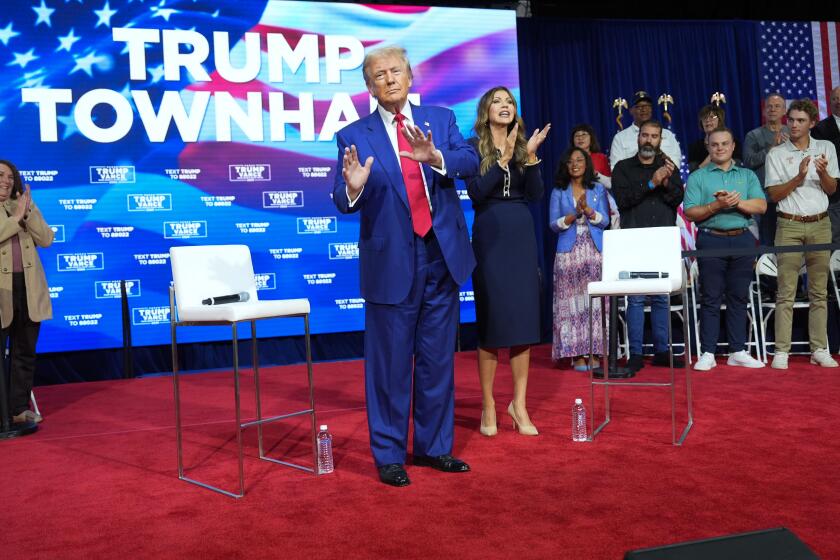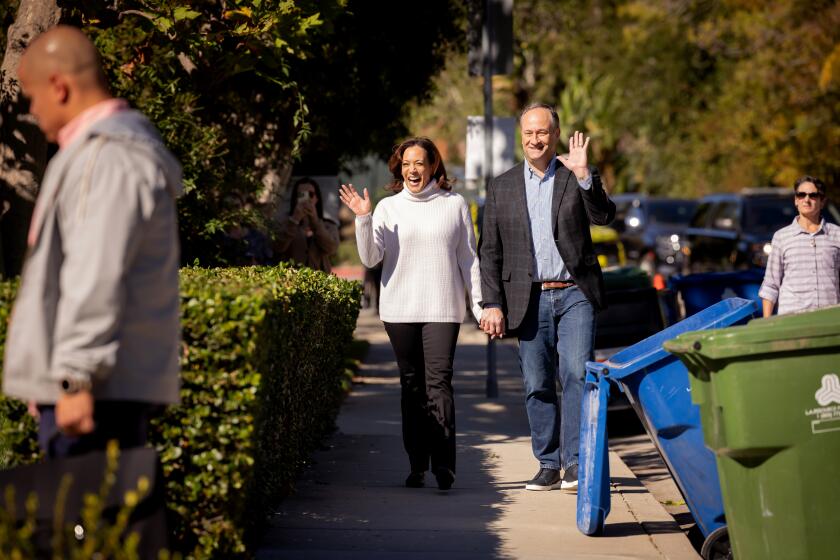Baugh Case Is Winding Down With a Whimper
The criminal campaign misconduct case against Assemblyman Scott Baugh began three years ago with a roar of prosecutorial indignation, its targets accused of a twisted conspiracy to flout state laws, defraud voters and manipulate the democratic process.
Now that state Atty. Gen. Bill Lockyer has asked a judge to drop the charges, the criminal probe against the Orange County Republican could end with a whimper, an ultimately empty political misadventure that proved more costly for the accusers than the accused.
Branding the criminal case against Baugh as weak, Lockyer referred the matter to the state Fair Political Practices Commission, which can levy up to $2,000 in civil penalties for each violation of campaign reporting laws.
There were other costs too: Baugh’s legal bills came to more than $350,000. Taxpayers paid well over $1 million, defense attorneys said, though the county wouldn’t say what the costs were.
Five political aides pleaded guilty to minor charges stemming from the probe and remain on probation. Former Dist. Atty. Mike Capizzi, who brought the charges against Baugh, lost his bid for state office last year amid the wrath of fellow Republicans.
“I think the Republicans paid a huge price,” said Bob Mulholland, a California Democratic Party official in Sacramento.
“I think they got a number of people in financial and criminal trouble as a result of trying to [influence an election]. No party wants to spend all of that time and money fighting the courts over something like that.”
The high-profile case against the Huntington Beach lawmaker was a key part of what prosecutors insisted was a conspiracy to manipulate voters in a critical 1995 election that assured Republican control of the state Assembly.
A county grand jury indicted Baugh in March 1996 on charges that he misreported thousands of dollars in loans and contributions to his election campaign. But that indictment was eventually thrown out when a judge found that prosecutors withheld from the jurors evidence favorable to Baugh.
Capizzi’s office refiled the charges, and a court later trimmed the case to two felonies and 10 misdemeanors. Baugh sought to remove the office from prosecuting the case, charging bias. A judge agreed last fall, finding “grave misconduct” by prosecutors. The case went to the state attorney general.
Lockyer on Friday mailed his dismissal motion to Orange County Superior Court Judge Francisco Briseno. The court had not yet received it Monday, Briseno’s clerk said, but a hearing is scheduled for Friday.
Capizzi, now in private practice, declined to discuss Lockyer’s actions over the weekend, saying he has put the matter behind him. His successor, Dist. Atty. Anthony J. Rackauckas, who supported Lockyer’s handling of the case, declined comment while the matter is pending before Briseno.
Baugh’s legislative colleagues in Sacramento on Monday joined to condemn what most saw as an abuse of power by a politically ambitious prosecutor--the equivalent, they said, of seeking a prison term for a traffic ticket.
“Everyone’s walking around up here today praising Bill Lockyer for ending this,” said Assemblyman Brett Granlund (R-Yucaipa).
“There was a bipartisan defense of Scott because everyone knew it was a witch hunt. Mike Capizzi went after Scott because he was trying to get elected attorney general at any cost,” he said.
Senate President Pro-Tem John Burton (D-San Francisco) agreed: “Anybody who has been in politics rightly or wrongly knows this was a pretty bogus beef. I think the lesson is that if you get a very zealous prosecutor, you better not spit on the sidewalk.”
It’s no surprise that Lockyer, a Democrat, sought to have the case dismissed, said attorney William Mitchell, former chairman of the Orange County chapter of Common Cause, a political watchdog group.
“Most politicians, the attorney general included, do not want to criminalize the campaign process,” Mitchell said. “Then they’re all potential victims.”
The lengthy prosecution of Baugh sent a chill through campaign workers across the state, said political analyst Sherry Bebitch Jeffe. First-time candidates were forewarned that they could be held accountable for everything their campaign workers did on their behalf, regardless of whether they knew about it.
“Candidates do have to exercise more oversight of their campaigns,” Jeffe said. “‘The risks are too large in this political environment to say, ‘You go do it. Don’t ask me.’ ”
Republican political analyst Allan Hoffenblum said Baugh’s defense benefited from a sense that prosecutors have overcriminalized politics while election laws have become more confusing and complex.
“It’s almost impossible not to violate some law, especially if you are a novice,” he said.
Republicans learned another valuable lesson, said Dave Gilliard, Baugh’s Sacramento campaign consultant. He said law-and-order Republicans learned to be wary of putting too much power in the hands of prosecutors. Baugh, in fact, became a champion of grand jury reforms while fighting the charges against him.
“The lesson here is that you have to watch government very carefully because it can use power we’ve given it in ways that go way overboard,” Gilliard said. “There’s been a lot of political damage because of this.”
About six weeks ago, Baugh’s defense team submitted its view of the case to Lockyer’s office. The defense argument centered on Baugh’s acceptance and reporting of campaign contributions from friends and family.
One Baugh defense attorney, Ron Brower, said he is “absolutely confident” that the Fair Political Practices Commission will settle the matter.
“The only thing that was proven was that Baugh used some very bad judgment,” Mitchell said.
More to Read
Get the L.A. Times Politics newsletter
Deeply reported insights into legislation, politics and policy from Sacramento, Washington and beyond. In your inbox three times per week.
You may occasionally receive promotional content from the Los Angeles Times.










